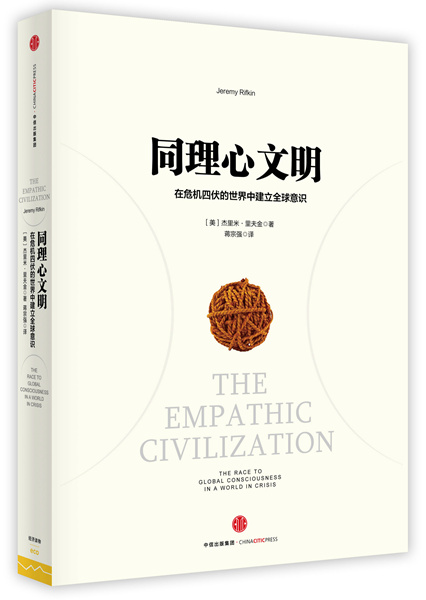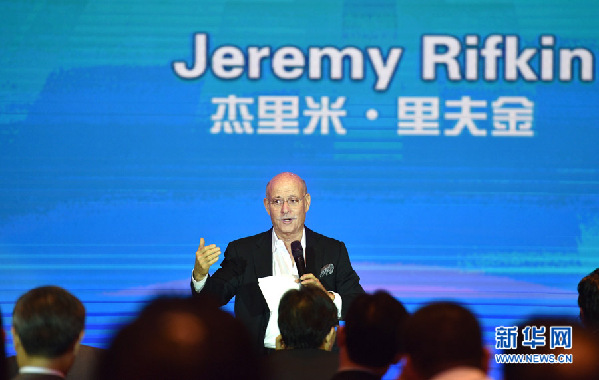Dawn of the Empathic Civilization
- By Kyle Calandra
 0 Comment(s)
0 Comment(s) Print
Print E-mail China.org.cn, November 6, 2015
E-mail China.org.cn, November 6, 2015
Walking along the Hutongs, Beijing's famous residential and commercial alleyways, the streets are a hive of construction and conversation. Traditional Peking Opera is blasting from handheld radios punctuated by car horns and bicycle bells. It's 6AM in China's capital city, and it feels like the entire country has woken up.
 |
|
[File photo] |
Emerging from more than a century of relative slumber, China has experienced unprecedented growth and development in the past 30 years. From the outside looking in, the middle kingdom is steadily moving into the center of world affairs, with Europe and North America ostensibly orbiting the gravity of the country's massive potential. For the Chinese people, each new dawn breathes the fire of life into the beating heart of China's economic dragon, marching the nation and its citizens toward a future of both great promise and tremendous challenges.
With China's rise has come the global realization that the county's increased involvement in international affairs is beginning to reorganize the existing world order, as it has already radically shifted the geopolitical worldview. Chinese policymakers are considering the implications of this realization. They are beginning to understand that with the country's developing position of leadership comes a larger sense of global responsibility.
China's rise has occurred alongside the rise of the digital age, the era of instant information, which has also begun to fuel a change in global consciousness. From a technological and social perspective, everything has changed. People from every corner of the world are connecting with each other, gradually diminishing the barriers of distance, language and culture.
Meanwhile, the world is still reeling from the effects of the Great Recession, regional conflicts threaten to disturb the already fragile stability of world systems, and more than ever, signs of an approaching catastrophic environmental crisis are everywhere. Existing social, political and economic structures are looking increasingly inadequate at providing viable, long-term solutions to these crucial challenges. Given the current state of world affairs, a re-examination, redefinition and reorientation of social, political and economic perspectives is swiftly and necessarily becoming the hallmark of both national and global development in the 21st century.
|
American economic and social theorist Jeremy Rifkin [Photo/Xinhua] |
With "The Empathic Civilization," American economic and social theorist Jeremy Rifkin offers a unique paradigm that details the mechanism that could help to reorient and even redefine the existing global geopolitical perspective. Rifkin describes his book "as an attempt to look at an alternative narrative to history that gives us the philosophical framework for ushering in an era of new technology and the new global economy."
"The Empathic Civilization" identifies the foundation of this framework, asserting that "a radical new view of human nature is emerging in the biological and cognitive sciences" which "forces us to rethink the long-held belief that human beings are, by nature, aggressive, materialistic, utilitarian, and self-interested." This radical new view is simply expressed as "the dawning realization that (human beings) are fundamentally an empathic species."
In an interview with China.org.cn, Rifkin discusses his book and the far-reaching implications of this radical new view concerning the evolution of human civilization.
"When I looked back at history, I found a narrative that was quite interesting," he explains , going on to say, "if you look at the major paradigm shifts in history, they really do share a common denominator… three defining technologies emerge and converge to create an infrastructure that changes the way we manage, power and move economic and social life."
In his book, Rifkin explains that these changes in economic and social life have continuously fueled a fundamental reorientation of the way human beings define their relation to other human beings in a society. He suggests that these "shifts provide a framework to the expansion of empathic engagement," which allows human beings to associate themselves with larger and larger "fictional families," expressed in terms of "blood ties, associational ties, religious ties and ideological ties."
"We may be on the cusp of the next expansion which is biosphere consciousness," says Rifkin, pausing briefly before asserting, "We're beginning to see our individual community as the biosphere."
Combining a powerful philosophical framework with a comprehensive new narrative of human history, "The Empathic Civilization" provides a brave and aspiring vision of the future. It's a future that China is beginning to grasp. Chinese political leaders and policymakers are currently focused on the country's 13th Five Year Plan, a timeline for economic development that specifically outlines the immediate future of China's economic activity in consideration of larger, long term implications.







Go to Forum >>0 Comment(s)